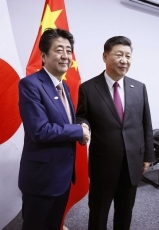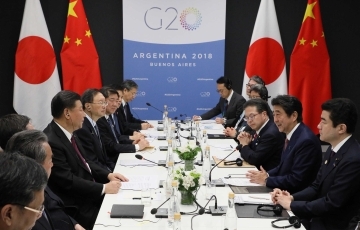Japan-China Relations
Japan-China Summit Meeting
November 30, 2018
 Photo: Cabinet Public Relations Office
Photo: Cabinet Public Relations Office
 Photo: Cabinet Public Relations Office
Photo: Cabinet Public Relations Office
On November 30, commencing at around 3:20 p.m. local time (December 1, around 3:20 a.m. Japan time), Mr. Shinzo Abe, Prime Minister of Japan, during his visit to Buenos Aires, Argentine Republic to attend the G20 Summit, held a Japan-China Summit Meeting with Mr. Xi Jinping, President of the People's Republic of China, at the Summit venue for approximately 35 minutes (simultaneous interpretation). The overview of the meeting is as follows. (The meeting was attended on the Japanese side by Minister of Economy, Trade and Industry Hiroshige Seko, Deputy Chief Cabinet Secretary Kotaro Nogami, Special Advisor to the Prime Minister Eiichi Hasegawa, Assistant Chief Cabinet Secretary Nobukatsu Kanehara, and others; and on the Chinese side by General Office Director of the Central Committee of the Communist Party of China Ding Xuexiang, Member of the Central Politburo of the Communist Party of China Yang Jiechi, State Councilor and Minister of Foreign Affairs Wang Yi, and others.)
1 Beginning
(1) The following is an overview of President Xi's opening remarks.
- I am glad that we are able to come to this distant land and meet again.
- During your recent visit to China, we were able to achieve a common understanding on many items through frank exchanges of views and close interactions.
- Such common understanding has gradually transformed into actions, and we are seeing new momentum in the Japan-China relationship. The two countries have more common interests under these new circumstances, and the situation is becoming in favor of establishing better terms for deepening the Japan-China relationship.
- I have confidence in the future of the two countries. Together with you, I intend to demonstrate political leadership and devote new energy to deepening the Japan-China relationship.
- During my visit to China, I was able to hold constructive discussions with you from a broad perspective regarding the roadmap for advancing the bilateral relationship that has entered a new stage.
- Next year I would like to invite you to visit Japan. Through continuous reciprocal visits between the leaders, I hope the two countries can further deepen exchanges and cooperation in all areas, including politics, economy, culture, and people-to-people exchanges.
- I am convinced that this will provide significant reassurance to the people of Japan and China and to people around the world, and lead to demonstrating the two countries' efforts to fulfill our responsibility towards peace and prosperity of the world.
2 Japan-China relations and North Korean affairs
(1) Prime Minister Abe stated that during his recent visit to China, the two leaders were able to set out a broad vision regarding the wide-ranging issues facing the bilateral relationship, including practical cooperation in the economic and trade fields and promoting people-to-people exchanges. Prime Minister Abe noted that Japan and China need to steadily implement the outcomes, including business cooperation in third countries and youth exchanges, as well as squarely address the remaining issues.
(2) Prime Minister Abe then raised three issues that Japan regards as particularly important: 1) import restrictions on Japanese food products; 2) tackling ship-to-ship transfers by North Korea; and 3) the East China Sea.
(2) Prime Minister Abe then raised three issues that Japan regards as particularly important: 1) import restrictions on Japanese food products; 2) tackling ship-to-ship transfers by North Korea; and 3) the East China Sea.
- Regarding import restrictions on Japanese food products, Prime Minister Abe welcomed the lifting of the import ban on polished rice from Niigata Prefecture announced on November 28, and asked China to swiftly lift the remaining regulations based on scientific evidence. In addition, Prime Minister Abe requested that Japan be able to resume exports of fruits and vegetables, Japanese sake, Japanese beef, and other items to China. President Xi responded that China would take appropriate responses based on scientific evidence.
- Regarding North Korean affairs, the two leaders reaffirmed the importance of fully implementing the relevant United Nations Security Council resolutions towards the denuclearization of the Korean Peninsula, a common goal of the two countries, and shared the view on the importance of addressing ship-to-ship transfers.
- Regarding the East China Sea, the two leaders reaffirmed the view that there will be no genuine stability in Japan-China relations without stability in the East China Sea, and that they would make the East China Sea a "Sea of Peace, Cooperation and Friendship." Prime Minister Abe reiterated the importance of improving the situation surrounding the Senkaku Islands and swiftly resuming negotiations on the "2008 Agreement." In particular, the two leaders shared the view once again that they would further enhance their communication towards the swift resumption of the negotiations regarding the "2008 Agreement."
3 Global economy and U.S. - China relations
(1) Global economy
- During Prime Minister Abe's recent visit to China, the two leaders shared the view on advancing free and fair trade. On this basis, they spent much of the discussion on the global economy, including cooperation at the G20.
- Prime Minister Abe stated that Japan has consistently placed emphasis on the WTO system and striven to maintain and strengthen the free trade system. He introduced that in this regard, it was a significant achievement that the TPP11 Agreement would enter into force on December 30 under Japan's leadership.
- With regard to the Regional Comprehensive Economic Partnership (RCEP) negotiations, the two leaders affirmed the importance of Japan and China working together to swiftly conclude a world-class, high quality agreement. They also shared the view on accelerating the negotiations for a Japan-China-Republic of Korea Free Trade Agreement (FTA).
(2) U.S. - China relations
- The two leaders exchanged views regarding the relationship with the United States in view of the recent U.S. - China relationship.
- Prime Minister Abe expected that a fruitful discussion would be conducted between President Xi and President Trump at the U.S. - China Summit Meeting to be held on the margins of the G20 Summit, including discussion on trade and investment issues, and that the two countries would make constructive contribution to the G20's overall discussion.
- Prime Minister Abe then noted that it was important for China to implement concrete measures regarding industry subsidies, intellectual property, and forced technology transfer in order to fundamentally resolve the issues.
- At the recent APEC Economic Leaders' Meeting, President Xi underscored that China would promote quality infrastructure development. In this light, Prime Minister Abe reiterated the importance of aligning infrastructure development with international standards, and the two leaders shared the view on strengthening communication between Japan and China.
4 Conclusion
The two leaders agreed to continue to exchange views from a broad perspective, including at next year's G20 Osaka Summit.

